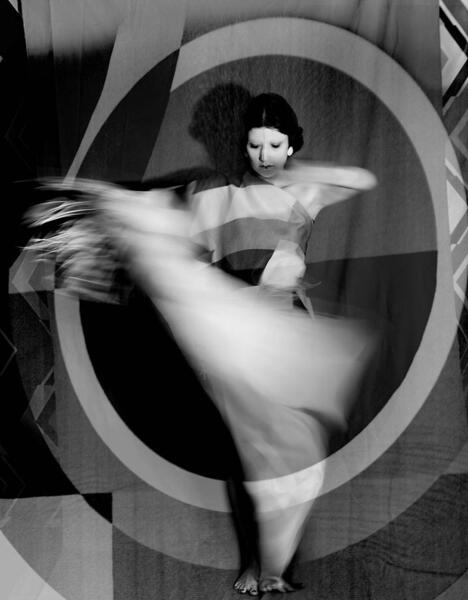Flavia Da Rin
Ruth Benzacar, Buenos Aires
Flavia Da Rin’s (Buenos Aires, 1978) alluring images usually distil fantasy, humor, and a dissimulated melancholy; they are structured around the artist’s appearance in constant and infinite transformation.

In Terpsícore entreguerras (Terpsichore between Wars), her exhibition at Ruth Benzacar gallery, the artist replaces on this occasion the colors and large format of her previous works with intimate portraits in black and white. Da Rin circumscribes the space of photographic intervention mainly to her image –always versatile and placed in real or illusory places – which include performance, since she performs and poses for the photographs. Terpsichore – a slender young girl with a jovial air and a light attitude – is in Greek mythology the muse of dance.
In these digitally worked photographs, Da Rin traces the steps of daring women who – between 1918 and 1939 – became associated with the historical avantgarde movements through dance: Lizica Codreanu (Romanian dancer of Diaghilev’s Ballets Russes; she captivated Brancusi and Sonia Delaunay); Giannina Censi (Italian, she performed futurist dance, the Aerial Dances); Mary Wigman (German, she was the source of inspiration for expressionist dance); Valeska Gert (dancer, actress, Berlin film and cabaret star, she was a harbinger of the punk movement); Martha Graham (pioneer of modern dance; according to experts, her influence on dance was comparable to Picasso’s influence on the visual arts).
Da Rin’s splendid identifications result in amazing images that capture exquisite and surprising movements, the varied selection of choreographies, the vigor of the dancers and their bonds with the visual arts. Thus, graceful and ethereal, Da Rin travels to the joyful margin of a historical moment which – even with the rise of fascism and a world economy in crisis – revolutionized the arts (Dadaism, constructivism, surrealism, futurism, modernism) and established a bohemian practice as problematic as it was fascinating.
-
 Sin Título (Codreano/Krull I) 2014. Photograph. Inkjet on paper, 13.3 x 9.6 in. / Fotografía. Impresión por chorro de tinta sobre papel, 34 x 24,5 cm Ed 7 + 2ap/pa
Sin Título (Codreano/Krull I) 2014. Photograph. Inkjet on paper, 13.3 x 9.6 in. / Fotografía. Impresión por chorro de tinta sobre papel, 34 x 24,5 cm Ed 7 + 2ap/pa




